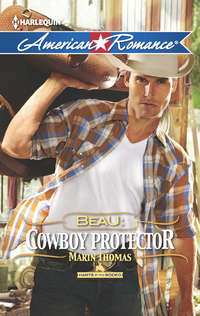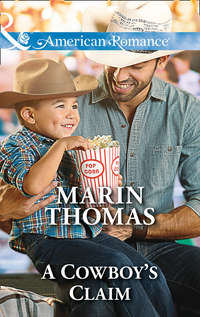
Полная версия
The Cowboy and the Angel
“The hat became a habit. And I told you the boots were a gift from my mother. She gave them to me shortly before she passed away, and you can’t beat a sheepskin jacket in this bitter cold.”
“I’m sorry about your mother.”
“Ready to discuss the warehouse?” he asked, ignoring Renée’s condolence. His mother must be a touchy subject.
“Let’s not beat around the bush. I need you to hold off on the demolition for a week.”
“Give me a reason.”
Suddenly she lost her appetite and left the table to stand before the floor-to-ceiling windows at the end of the suite. The lights of Windsor, Ontario twinkled across the river. “Can’t you trust me?”
“Trust you? I don’t even know you.” He joined her at the window, shoving his fingers through his dark hair, mussing the recently combed strands. “It’s going to take a hell of a lot more than trust me to convince me to halt anything.” When her gaze remained trained on Canada, he clasped her shoulder—his fingers firm, yet gentle. “Maybe I can help. I’ve got some pull with the—”
She stepped aside, breaking contact. The wealthy assumed they had the answer to every problem, when in fact, their interference usually made things worse. Right now she was battling a community development board comprised of local businessmen. She needed their approval for a recreation center for at-risk kids, which she hoped to open in the Warehouse District.
A year ago she’d acquired funding for the project and had approached the board for permission to purchase a deserted building that had once housed a dry cleaners and a food market. The board members denied her request citing that a center for undesirable kids would have a negative impact when they were trying to attract new businesses to the area.
For over a year Renée had worked tirelessly on the project, believing at-risk kids deserved a safe space to hang out and socialize after school. Instead, the children were left in the cold—like those she was attempting to assist now.
“What’s it going to be, Renée?”
Dear God, she hoped she wasn’t making the biggest mistake of her life. “I can’t tell you. I’ll have to show you.”
Chapter Three
A night sky of sparkling stars greeted Renée and Duke when they left the hotel. “Maybe we should wait until tomorrow,” he suggested. “It’s dangerous along the Riverfront after dark.”
“If you’re concerned about safety, why are you moving your company there?” She marched toward the visitor parking lot.
Picking up his pace, Duke followed. “My office building will have surveillance cameras and a security guard 24/7.”
“Not to worry. I doubt even criminals are foolish enough to venture out in these frigid temps.”
The fact that Renée had grown up in Detroit and knew the area did nothing to ease his anxiety. “Should I follow you?”
“We’ll take my car.”
When they reached the wagon, he held open the driver-side door for her, then skirted the hood and hopped into the passenger seat. He fumbled with the lever then shoved the seat as far back as possible, which still left his knees pressed against the glove compartment.
She eyed his scrunched frame. “Would you rather drive your truck?”
“I’ll manage as long as you don’t slam on the brakes.”
They made the short trip in silence. She turned into the Screw & Bolt Factory parking lot and drove past the construction crane to the far end where the gloomy outline of the building materialized. His muscles tightened with dread as he unfolded his long legs and got out of the car. A sixth sense warned he’d be better off never learning what Renée wanted with the warehouse.
“This way.”
Duke walked at her side, his cowboy boots dragging across the brittle pavement. Hands fisted, his eyes fixated on the shadows, ready to protect Renée from whatever evil lay in wait.
As they drew closer to the building, he spotted the rusty sign: Industrial Public Warehouse. Renée paused to pull a flashlight from her coat pocket. She switched it on and they entered through a side service door. The yellow beam splashed across the chipped brick walls displaying the tags spray-painted by a local graffiti artist. Duke indicated the image of a bear-shaped man surrounded by smaller bear women. “The drawings are pretty good.”
“I’ve encouraged Troy to apply to art school.”
“You’ve met the kid who vandalized this property?” Duke’s eyes prowled the area as they crossed the first floor. The popping and cracking of glass beneath their shoes echoed through the emptiness.
“Troy’s nineteen. Doesn’t have a job. Runs around with a group of troublemakers.”
The kid should put his talent to better use than defacing public warehouses. Duke imagined his colleagues’ astonishment if he commissioned the delinquent to sketch bears on the walls of the lobby in the new Dalton Industries building.
“Watch your step,” she said as they entered a stairwell.
When they reached the third floor, light from the full moon spilled through a gaping hole in the wall, illuminating battered parts of thirty-year-old cars used for spray-painting practice. A skateboard ramp claimed the fourth floor. Someone had put in a lot of effort and time hauling large planks of plywood up four flights to construct the ramp.
They continued to the fifth and final floor. Duke and his Realtor hadn’t bothered to investigate the top floor, assuming they’d find more of the same—debris and trash. She knocked on the door. Once. After a long pause she added two more knocks.
Was that a signal? What or who occupied the fifth floor?
Flashlight aimed in front of her, Renée opened the door.
Piles of newspapers and empty food containers littered the area. After several steps, she held up a hand and he stopped. The beam of light skirted across a maze of cardboard boxes that connected to form a tunnel. A towel concealed the opening at one end.
“It’s me. Everyone okay in there?” Renée spoke in a hushed whisper.
Seconds ticked by and no sound. Finally a small hand pushed the towel aside and a face popped into view. A kid’s face. Although the temperature in the building hovered below freezing, Duke’s forehead broke out in a sweat. Images of a wrecking ball slamming into the side of the brick wall and children falling to their deaths flashed before his eyes.
One face turned into two. Three…four…holy, hell. A gang of kids had set up camp in his warehouse.
Renée ignored Duke’s sharp indrawn breath, focusing on the children in front of her. “Hey, everyone. I brought a friend.” Duke Dalton wasn’t a friend by a long shot, but she didn’t wish to frighten the children. Renée had discovered the clan a few days ago thanks to a tip from a transient woman in one of the city shelters. The elderly lady had overheard teenagers whispering about a group of kids hiding in a building along the Riverfront and had reported the news to shelter personnel.
The kids, save one, were familiar to Renée—most had been in and out of the foster-care system for years. Timmy, a shy, petite boy, slipped from the tunnel first. “Did you bring food?”
Oh, shoot. Guilt pricked her that she’d lounged in Duke’s hotel room enjoying pizza while the kids had waited for supper—which she’d forgotten.
“Ms. Sweeney wanted to ask what everybody’s hungry for.” Duke’s masculine voice sent Timmy scampering inside the tunnel.
Renée shot Duke a startled glance, surprised he’d come to her rescue. Flustered, she said, “Mr. Dalton won’t hurt you.”
Crystal, the Goth thirteen-year-old, emerged. Dressed from head-to-toe in black, she wore bell-bottom cargo pants with silver chains attached to the waistband, a T-shirt and clunky combat-style boots. Eyes rimmed with dark shadow and mascara, the teen had dyed her eyebrows and hair to match the ebony polish on her nails. Her menacing gaze fixated on Duke and she snarled, “Who’s that?”
“This is Mr. Dalton. He’s offered to buy supper tonight.” When no one else came out, she said, “I need to make sure everyone is okay. If you don’t come out, you don’t eat.”
“You heard Ms. Sweeney,” Crystal called over her shoulder. “Hurry up. I’m starving.”
One by one, five children crawled from the crude shelter. “José, where’s your jacket?” The oldest in the group at fifteen, the boy jutted his chin defiantly. “It’s hot in there.”
“Well, it’s not out here.” She locked eyes with José, refusing to allow him to gain the upper hand. Thin and gangly, the shaggy-haired teen stood several inches taller than Renée. He had severe acne and she guessed his long bangs were meant to conceal the pimples across his forehead. After a tense few seconds he retrieved his coat.
Evie, Crystal’s seven-year-old sister, shuffled forward. “Can I have milk tonight?” The cherub’s cheeks glowed bright pink. Renée brushed aside a limp hank of blond hair and pressed her fingers to the child’s forehead, relieved her skin felt cool. “Yes, you may have milk.”
José exited the tunnel wearing a jacket with sleeves that ended above his bony wrists. She presumed he’d begun a growth spurt. The possibility frustrated Renée. The children shouldn’t be living in cardboard boxes in an abandoned building with temperatures well below freezing at night. Every child was entitled to a warm bed and three square meals a day. Plus hugs. Kids needed hugs, which reminded her…she held out a hand toward Timmy. He hobbled closer, dragging his left foot behind him. The boy had been born with a clubfoot and had never received medical treatment for the deformity.
“Doing okay?” she asked, wrapping an arm around his shoulders. After the quick hug she directed the flashlight at Timmy’s freckled face, searching for signs of injury, illness. He smiled, exposing a gap between his teeth.
“When did you lose your front tooth?”
“This morning. Ricci pulled it.”
“Maybe Ricci should be a dentist when he grows up.” Renée winked at the eight-year-old.
“No way,” the boy protested. “I’m gonna race cars.” She might have found his answer amusing if not for the fact that the Hispanic boy had been picked up twice by police for participating in illegal street racing. He’d been a passenger in the vehicles, but Renée feared one day Ricci would slide behind the wheel. If Renée didn’t secure him a decent foster home soon, he’d end up in the state juvenile detention center before his twelfth birthday.
“I’m gonna fly airplanes,” boasted Willie. Arms extended like wings, the six-year-old African American boy circled the group, making loud obnoxious engine noises. Willie was a crack baby. His cognitive development was a little slow, but not worrisome. It was his hyperactivity and emotional outbursts that had gotten him kicked out of every home he’d been sent to. Most foster parents weren’t equipped to handle his behavioral issues.
While the kids engaged in good-natured bantering, Renée hugged each child in turn. She made sure they all felt the touch of a loving hand.
“Does that guy—” Crystal motioned to Duke “—have anything to do with the big crane we saw earlier?”
“Yes.” She wouldn’t lie to the children, but she refused to reveal the entire truth for fear the kids would panic and scatter. “Mr. Dalton owns this building.”
The kids huddled close—José and Crystal standing guard in front of the younger ones.
Duke winced at the group’s reaction and Renée wished to reassure him that he’d done nothing wrong. Street kids trusted no one. And even though she considered Duke’s height and build, his square jaw and dark eyes attractive, the children no doubt found him formidable. “Mr. Dalton, I’d like you to meet your temporary tenants.
“This is José.” To her pleasure, Duke extended his hand. To her displeasure José refused the handshake.
Ignoring the rebuff, Duke said, “Nice to meet you, José. Looks as if you’re taking good care of everyone.”
The boy’s slim shoulders straightened, but the mutinous glare remained in his eyes. Renée wanted to hug Duke for complimenting the teen.
“This is Crystal and her sister, Evie.”
Again Duke offered his hand. Crystal followed José’s lead and kept her hands shoved inside her coat pockets. Evie giggled, burying her face in her sister’s jacket.
“And our resident pilot is Willie.” The boy marched over to Duke and shook his hand, pumping Duke’s arm like a circus clown. “What’s up, dude?” He laughed at his own joke.
“Hello, Willie.” Duke didn’t seem bothered by the rambunctious boy.
“Then we have Timmy and Ricci.”
Ricci stayed put, but Timmy wandered closer, his twisted foot scraping against the cement. If Duke noticed the boy’s deformity, he showed no sign.
“Nice to meet you, boys.”
After the introductions, Timmy asked, “What are you gonna do to our building?”
Renée cringed at the word our.
“I intend to—”
“Mr. Dalton hasn’t finalized his plans for the warehouse,” she interrupted.
“We’re not stupid,” Crystal spouted. “You’re gonna knock it down.”
“Not yet,” Renée assured the girl.
“Aw, man. Are we gonna have to find a new home?” Ricci whined.
Renée had been involved in social work too many years to allow her emotions to get the best of her, but the fact that Ricci considered a vacant building a home made her eyes burn with anger—anger that these and many more kids had been left to fend for themselves by the system.
“You don’t have to leave yet,” she assured them.
Duke stirred uneasily and Renée regretted that she’d introduced him to the kids. But darn it, he’d forced her back to the wall. She had to prevent him from demolishing the warehouse while she attempted to line up foster homes for the children—not an easy job when the kids’ files had been flagged as troublemakers.
“Are you and the others safe at night, José?” Duke asked, glancing at Renée.
She balled her hands into fists. Clearly the man believed she’d failed in her job as a social worker to meet the needs of these kids.
Haven’t you, Renée? She blamed bureaucratic red tape for not being able to help all of Detroit’s children in crisis. When a child slipped through the cracks, she asked herself if there was anything more she could have done. Had she missed details that might have made a difference in placing the kids in foster homes? She hated that Duke made her doubt herself. She’d only met him two days ago, but for some stupid reason the cowboy’s opinion of her mattered.
“We’re safe here,” José mumbled. He looked at Renée before adding, “Two drunks sleep in the building next door, but they leave us alone.” The teen indicated the Detroit United Railway Company powerhouse. The shell of a building would make an interesting view from the window of Duke’s executive office.
“Glad to hear you’re watching out for strangers,” Duke said.
Crystal rolled her eyes. “We don’t go out after dark.”
Before the conversation lost its amicableness, Renée inquired, “How are you doing with supplies?” This past Wednesday when she’d discovered the group, she’d collected hand wipes, toilet paper, Kleenex, food and water.
She’d offered to escort the kids to a shelter to shower, but they’d refused, understanding that they’d be required to give their names and then be detained by the Department of Child and Family Services until an investigation into their situation had been conducted. These kids weren’t new to the system.
“We need another blanket.” José spoke up.
“Did one of the covers get ruined?” Renée had given them a car-trunkful of bedding from a local church.
“Not exactly.” José’s gaze skirted her face.
Renée deduced that the teen had traded the blanket for a pack of smokes. He had a habit of stealing from his foster homes and swapping the items for cigarettes. “Are you smoking again?”
“What if I am?” The words would have sounded more threatening if his pubescent voice hadn’t cracked.
Renée narrowed her eyes, held out her hand and dared the teen to defy her. After a tense standoff, the teen withdrew an almost empty pack of cigarettes from his pants’ pocket and handed it over. “Thank you.” Then she spoke to the group. “What about breakfast foods and snacks?”
“We’re good,” Crystal answered.
The parishioners of Most Holy Trinity Church had donated granola bars, crackers, cookies and a bottle of chewable vitamins for the children. She hadn’t dared leave the vitamins with the kids or they’d gobble them up like candy and become ill. She reached into her coat pocket and withdrew a bag filled with the animal-shaped supplements. “Hands out,” she instructed, placing a tablet on each palm.
“Okay, then. Any last requests before Mr. Dalton and I fetch supper?”
Timmy raised his hand. “I finished my math problems.”
“Bring me the workbook so I remember what level to get next time.” A retired teacher in Renée’s neighborhood had dropped off boxes of outdated math and reading materials to area shelters and Renée had confiscated a few for Timmy. “Anyone else need a workbook?”
A mini revolt erupted, and she laughed. “All right, all right.” The last thing on these kids’ minds was learning.
When Timmy handed over his work packet, Renée said, “This is fourth-grade level. I’m impressed.” Out of all the kids, Timmy loved to learn. “I’ll find you a fifth-grade level.” She hugged each child again. Except José—he stepped aside, being too tough for affection.
“Stay safe and warm and—”
“Watch out for each other,” Evie finished for her.
Renée waited until the kids crawled inside the cardboard tunnel. This was the most difficult part—leaving them behind. Then she felt Duke’s hand on her elbow. Drat the man for his solicitous support—he was the enemy. In silence they navigated the stairwell to the first floor.
As soon as they exited the building he growled in her ear, “Why the hell are those kids living in my warehouse? And why the hell are you allowing them to?”
DUKE ESCORTED RENÉE to the station wagon, glancing over his shoulder, worrying that the drunks in the nearby building might follow them. Cold wind whipped his face, but red-hot anger melted the icy sting.
Gut clenched as if he’d been punched by the world’s biggest bully, he forced his fingers to relax against Renée’s arm lest he give in to the temptation to squeeze until he cut off her blood supply. He was on the verge of losing control—both terrifying and humiliating. He teetered on the rim of an emotional cliff unsure how to combat the surge of feelings assaulting him physically and mentally.
Fear. That the kids on the fifth floor might be dead right now if Renée hadn’t arrived at the warehouse in time to prevent the wrecking ball from pummeling the brick walls. Anger. That Renée hadn’t come clean with him Friday night at the diner. Fury. That the children had been deserted and left to fend for themselves like a pack of wild dogs. And lastly, guilt of all things. Tonight he’d sleep in a warm, clean bed while the kids on the fifth floor huddled together in a cardboard tunnel.
When they reached the car, he yanked open the driver’s-side door for Renée, then crawled into the passenger seat. With new clarity, he appreciated the saying ignorance is bliss. Through the years, he’d read newspaper articles and viewed newscasts about the country’s homeless. He accepted that these people inhabited the world. But until tonight they’d never been a part of his world.
“Duke?” The soft, shaky question snuck past his fury.
“I’m thinking,” he snapped. Was he nuts? An idiot to believe he’d relocate his company to Detroit and the process would unfold without a hitch? He envisioned a new glass-and-steel structure replacing the old warehouse—an architectural showpiece standing tall and proud in the middle of blocks of rubble. Had he been so determined to escape his stepfather’s shadow that he’d convinced himself buying that block of rubble was a wise decision?
“Are you okay?” Worry carved a line across Renée’s forehead.
“No, I’m not okay.” He clenched his hands into fists. “And you’d better not be okay with the kids living in those conditions.” She jerked as if he’d slapped her.
Add remorse to the list of feelings gutting him.
“It’s a long story.” Her sigh reached inside his chest and yanked hard. “Sure you want to hear?”
“I don’t have a choice, do I?”
She started the car and left the lot. As she navigated what little traffic there was on a Sunday night, he muttered, “I can’t get their faces out of my mind.” There was something terribly unconscionable about discarded children.
Duke had felt alone when his father had passed away, but he’d had his mother. She might not have spared much time for him, but at least she hadn’t left him to fend for himself the way these children had been.
“I’ve seen more bad than good in my line of work,” Renée said. “Believe me, there are worse dwellings for those kids.”
“They shouldn’t be allowed to stay there,” he argued.
“They aren’t being allowed.” At his fierce scowl, she added, “There’s a reason they’re getting away with hiding out in a derelict building.”
“I’m listening.”
“The city doesn’t have enough foster parents available on a continuous basis for kids in crisis. When a child is taken from a parent or found on the streets they often end up in city shelters while we investigate their situation and attempt to make permanent arrangements for them.” She turned left at the corner and drove along a street lined with fast-food restaurants.
“The holidays are a difficult time to secure permanent care for kids. Most parents are already struggling to put gifts under the tree and a nice meal on the table. Many foster parents refuse to bring a troubled child into the mix during a time when families are supposed to rejoice and get along.”
“Why not put the kids in a shelter until after Christmas? They’ll freeze to death in this weather.” Even though the children wore heavy coats, that didn’t mean their toes and fingers weren’t constantly numb.
“Shelters aren’t safe for young children or teens.”
“Better to take their chances there than die of hypothermia,” he argued.
“Typical comment from someone who doesn’t have a clue.” Renée’s fingers tightened until the knuckles turned white, and Duke figured she’d rather choke his neck than the steering wheel.
“Then give me a clue.”
“Shelters are magnets for child predators and gangs. Kids risk getting raped, molested or beaten in them.” She glanced across the seat. “You’d be wrong if you believed for a minute those children would rather stay in a shelter than out in the cold.”
“Okay, so there are problems with a shelter, but those same problems exist on the streets. What if gang members discover the kids and harass them? Or those drunks who sleep next door suddenly pay a visit in the middle of the night? At least in a shelter they’d sleep on a bed instead of cold concrete. And they’d eat regular meals.”
Renée didn’t comment as she pulled into a drive-through restaurant and ordered eighteen tacos and twelve cartons of milk.
Duke pulled out his wallet. “I admit I grew up with advantages most kids only dream about.” Even before his father had died and his mother had hooked up with her second husband, his family had lived in a nice home in an upper-middle-class neighborhood.
“Put your wallet away,” she grumbled, digging through her purse.
“I insist.” He doubted a social worker made enough money to feed herself let alone six kids. When Renée refused the two twenty-dollar bills he held out, he stuffed the cash into the purse on the seat between them. “At their age I was contemplating my next Little League game. Those kids worry over where their next meal’s coming from.”
“They’re not starving to death.” She drove forward to the order window and paid. “I’m doing my best to care for them until foster homes become available.”
The bright lights of the restaurant flooded the car and Duke swallowed a curse at the unnatural sheen in her eyes. He’d been wrapped up in his own frustration and hadn’t considered how difficult the situation was for Renée. Hell, if he was this upset after only meeting the kids once, he imagined how disturbing it was for Renée to interact with the children on a daily basis.







